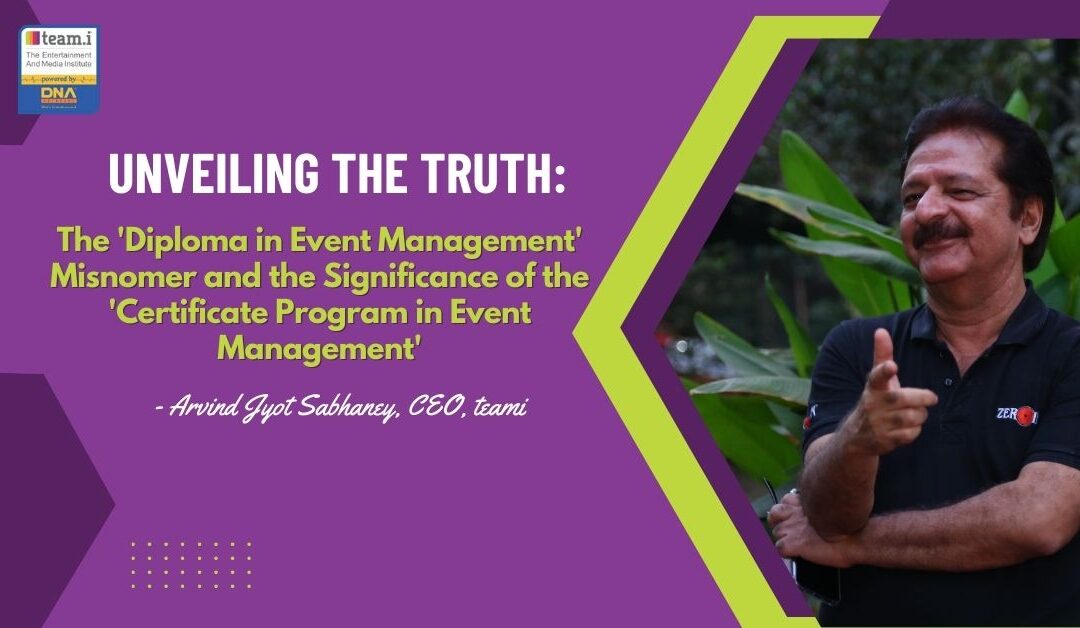Introduction: The realm of education is diverse and dynamic, with a myriad of courses catering to different interests and career aspirations. One such domain that has gained immense popularity is Event Management. However, a closer inspection reveals a misleading trend—the use of the term ‘Diploma in Event Management.’ In this article, we will unravel the truth behind this misnomer, shedding light on the distinction between formal and non-formal diplomas, and explore how institutes like Teami have taken a transparent approach with their ‘Certificate Program in Event Management.’
Understanding the Diploma Conundrum: To begin with, it’s crucial to comprehend the dichotomy in the types of diplomas offered in both formal and non-formal education sectors. Formal diplomas are typically issued by government-approved and recognized institutions, colleges, and universities. These diplomas hold significant weight in the professional world, often serving as a testament to one’s educational achievements. On the flip side, non-formal diplomas are issued by entities outside the traditional education sector, such as NGOs, companies, and societies. While these diplomas may still carry value, they often lack the widespread recognition associated with formal diplomas.
The Illusion of the ‘Diploma in Event Management’: In recent years, the term ‘Diploma in Event Management’ has become a catchphrase in the education industry, enticing individuals aspiring to enter the dynamic field of event management. However, a closer look reveals that no reputable university offers such a course. The use of the term ‘diploma’ may create an illusion of formal recognition, leading students to believe they are obtaining a qualification equivalent to those granted by established educational institutions.
Teami’s Transparent Approach: The ‘Certificate Program in Event Management’: Amidst this misleading trend, institutes like Teami have chosen a transparent path by offering a ‘Certificate Program in Event Management.’ This program acknowledges the distinction between formal and non-formal education, providing students with clarity about the nature of the qualification they are pursuing. The ‘Certificate Program’ is designed to impart comprehensive knowledge and practical skills required in the event management industry, with a focus on real-world applications.
EEMA Recognition: Validating the ‘Certificate Program’: Teami goes a step further in establishing the credibility of its ‘Certificate Program in Event Management’ by securing recognition from the Event and Entertainment Management Association (EEMA). EEMA is a renowned industry association that sets benchmarks for excellence in event management. The association’s acknowledgment of Teami’s program adds a layer of validation, assuring students that the skills they acquire align with industry standards.
The Curriculum: Bridging Theory and Practice: A key aspect of Teami’s ‘Certificate Program in Event Management’ is its thoughtfully crafted curriculum. The program strikes a balance between theoretical knowledge and practical application, ensuring that students not only understand the principles of event management but also gain hands-on experience. Modules cover a wide range of topics, including event planning, marketing, budgeting, logistics, and client management, preparing students for the multifaceted nature of the industry.
Industry-Relevant Skills: Preparing for the Real World: One of the criticisms often levied against traditional diplomas is the perceived gap between academic learning and real-world application. Teami’s approach addresses this concern by emphasizing industry-relevant skills. Students are exposed to case studies, live projects, and internships, providing them with a taste of the challenges and dynamics of the event management field. This practical exposure enhances their employability and equips them with the tools needed to thrive in the competitive industry landscape.
The Role of Non-Formal Education in Skill Development: While formal education plays a crucial role in laying the foundation for knowledge, non-formal education, as exemplified by Teami’s ‘Certificate Program,’ contributes significantly to skill development. The program goes beyond theoretical concepts, focusing on honing practical skills that are directly applicable in the workplace. This aligns with the evolving needs of industries that increasingly prioritize skill sets over traditional qualifications.
Addressing the Stigma: Enhancing Perception of Non-Formal Education: The stigma attached to non-formal education is often a barrier for individuals considering alternative paths to career development. Teami’s commitment to transparency, coupled with EEMA recognition, contributes to dismantling this stigma. By showcasing the value and relevance of the ‘Certificate Program in Event Management,’ Teami challenges preconceived notions about the efficacy of non-formal education in preparing individuals for successful careers.
Conclusion: In conclusion, the ‘Diploma in Event Management’ misnomer prevalent in the industry highlights the importance of discernment when choosing an educational path. Teami’s approach with the ‘Certificate Program in Event Management’ not only acknowledges the distinction between formal and non-formal education but also actively seeks industry validation through EEMA recognition. This transparent and industry-aligned program serves as a beacon for individuals seeking a practical and relevant education in event management, bridging the gap between academia and the real-world demands of the industry.

